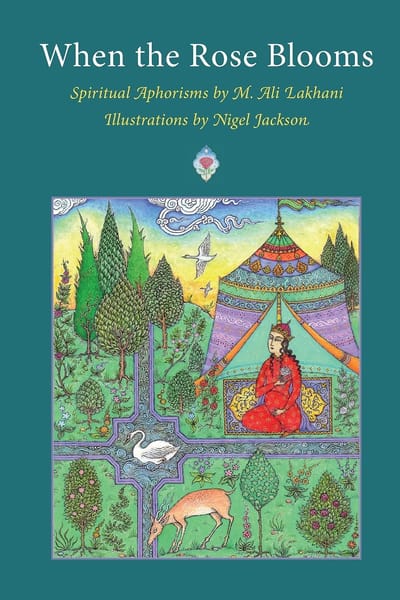A voice from the edge of silence is heard throughout this book; it is at turns metaphysical, mystical, moral, practical, wounded, healed, searching and even humorous.
Published by the Matheson Trust in 2021, When the Rose Blooms is a collection of spiritual aphorisms by M. Ali Lakhani, illustrated by Nigel Jackson. The book's introduction by Barry McDonald is reproduced below.
Who has not known the wonder of seeing the first few stars rising in the dusk? Against the darkening immensity of the sky, though they are very far away they seem to speak of what is most near. In realms of love and pain who has not known treasures lost and found, dreamed and known awakenings that shaped one’s life. And who has not felt oneself part of a vast tapestry, too large to see, sewn by a single thread running through all things seen and unseen, without beginning and without end. By such moments we are marked by an invisible, but indelible, ink. Philosophers and poets write with this ink and it is this writing, interwoven of speech and silence, which blossoms and bears fruit in the clarifying beauty of these aphorisms.
The geography of these utterances, each like a signpost, maps a vast and ancient territory in few words.Tracing the frontiers of Prayer and Silence (‘If you let the silence within you sing to itself, you will become its song’); Self and Other (‘We are merely translations of each other’s lives’); Enclosures and Openings (‘Immensity threads itself through a needle’s eye’); Exile and Longing (‘What we cannot hold in our arms, we hold even closer in our dreams’); Possibilities and Outcomes (‘The privilege of life is not to open doors, but to choose those by which to enter’); Seen and Unseen (‘Does the world disappear when we close our eyes? We are closer than we imagine to what we cannot see’); and Inwardness and Transcendence (‘The fire dies into the ashes of its flame’). A voice from the edge of silence is heard throughout this book; it is at turns metaphysical, mystical, moral, practical, wounded, healed, searching and even humorous. This voice is that of the spiritual seeker’s heart and mind laid bare and the nearly whispered words are like small whirlpools beckoning the attentive reader into the depths of our shared human experience and, in those depths, we find God. The drowning to which it calls us means death in life; but it also means life in death.
At their highest points of tension these aphorisms synthesize entire novels, works of philosophy and spirituality, and poetry, into a few chiseled words, often wrought into a single sentence reminiscent of Blake’s seeing ‘infinity in a grain of sand’.There is a story of an ancient Chinese emperor who held a poetry contest, promising some great treasure for the winning poet. All of the famous poets of the land came from far and wide and offered the emperor their most beautiful poems. One had composed a poem using only a single word, a mysterious word lost in the history of telling this story,and it was the winning entry.The primordial simplicity which must have set that word to music resonates through the pages of this book; one is reminded of the symmetry of snowflakes, illuminating and purifying, dancing in the dark.This simplicity is close to wisdom because simplicity is the essence of unity; and in the dazzling light of unity, seeing the One in the many, all wisdom is revealed. By extension, one could say that to hear God one must hear the Silence which threads through all of the many forms of sound. Silence, it is said, is a name of the Buddha.
Although I referred above to the frontiers, or themes, traced in this book it is important to note that frontiers are crossed with a single step. The themes merge seamlessly into each other; and by way of utilizing another metaphor, as the whole tapestry contains each individual thread, each thread speaks of the whole. Scholars of various spiritual traditions will no doubt detect elements of Sufism, Zen, Vedanta, and other esoteric schools of thought in these aphorisms; however, the text cannot be pinned down and classified under any specific heading.These utterances are universal in their meaning and appeal, they do not seem to be of any time or place; they speak from a center which is everywhere and nowhere at the same time.They speak to travelers on a timeless journey. One is immediately struck by the authenticity and genuine reality of these words, like jewels lit from within, sparingly used, and often directing the reader to the very precipice of what it is possible to say.‘Silence proclaims silence. Man, however, searches for something to hear’. Listening to these nearly unspoken words, one hears the lilt of sunlight on a flowing stream, the cry of a falling star, or the stories told by a grain of sand. If you cannot hear, then listen more closely. In the depth of your listening there are rewards beyond measure.
When the Rose Blooms: Spiritual Aphorisms can be purchased here.






